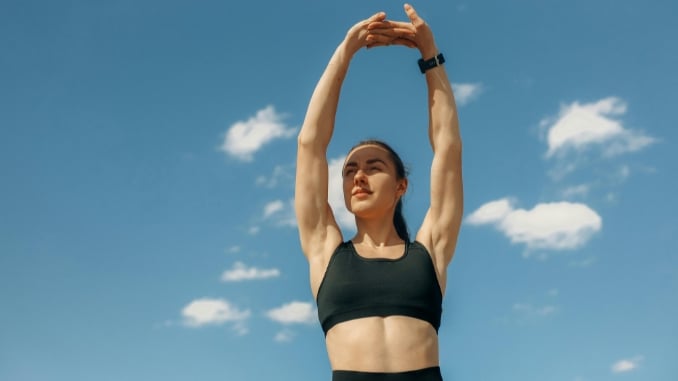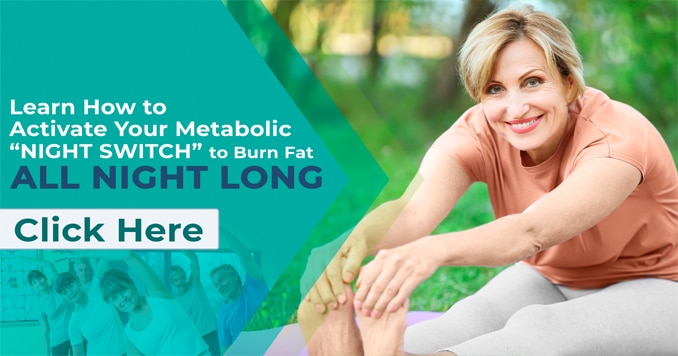A quick 5-minute post-run stretch routine including dynamic stretches [1] designed to prevent injury, improve flexibility, and speed recovery. Includes step-by-step instructions and visuals to help you cool down effectively.
Every run takes a toll on your body—tight muscles, elevated heart rate, and increased strain on joints. But skipping your post-run stretch is one of the biggest mistakes runners make. A consistent cool-down routine is essential not just for flexibility and recovery, but for avoiding injuries that could sideline you from your next run.
This 5-minute post-run stretch routine uses a mix of dynamic and static stretches to restore blood flow, lengthen muscles, and prepare your body for optimal recovery [2]. Whether you’re a weekend jogger or a marathoner, these moves will help you bounce back stronger.
1. Overhead Stretch
Purpose: Opens the chest, resets posture, and realigns the upper body.
- Begin in an upright standing position with your feet hip-width apart.
- Maintain good alignment with your head, shoulders, hips, and legs.
- Engage your core muscles. Raise both arms overhead as you gaze towards the ceiling.
- Hold the position for several deep belly breaths, in through your nose and out through your mouth.
2. Upward Facing Dog
Targets: Core, hip flexors, lower back, and thigh muscles.
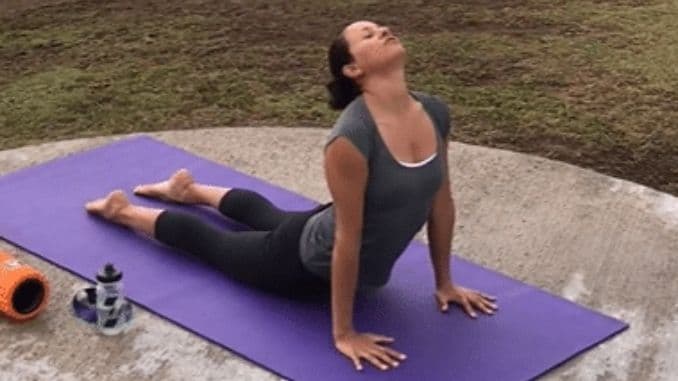
- Move into a straight-arm plank position, maintaining good alignment with your head, shoulders, hips, and toes.
- Lower your hips to the ground, arching through your back to stretch the hips and low back area.
- Hold this position for a couple of seconds.
- Take a deep belly breath through your nose and out through your mouth.
- Relax and return to the starting position.
3. Child’s Pose
Targets: Lower back, glutes, shoulders.
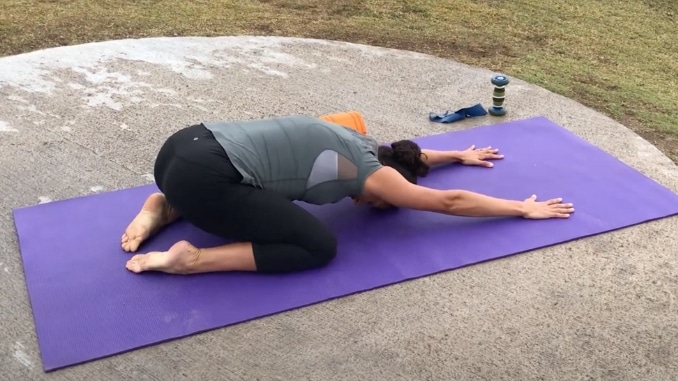
- Begin in a 4-point position with your hands under your shoulders and your knees under your hips, wider than hip-width apart.
- Engage your core and shift your hips back to your feet as you extend your arms overhead or bend your elbows into a prayer position.
- Lower your chin or forehead to the floor and relax your mid-back area for a light stretch.
- Hold this position for several deep belly breaths, in through your nose and out through your mouth.
- Relax and return to the starting position.
4. Lizard Pose
Targets: Hip flexors, thighs, and groin, including the leg muscles.
- Begin in a 4-point position with your hands beneath your shoulders and your knees under your hips, maintain good alignment of your head, shoulders, hips, and knees.
- Take a big step forward with one foot into a low lunge position and plant your foot on the outside of your hand to widen your hips.
- Keep your toes pointing straight ahead.
- Tighten your abdominal area.
- Palms pressed firmly on the floor for support.
- Hold this position for several deep belly breaths, in through your nose and out through your mouth.
- Repeat the movement on the opposite leg.
5. Walking Downward Dog
Focus: Calves, hamstrings, and stretches in the shoulders.
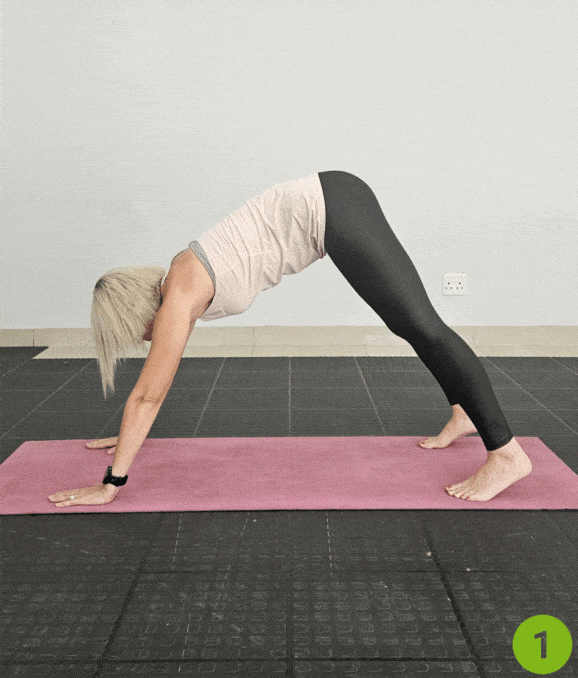
- Move into a four-point position again.
- Contract your core, push back with your arms and lift your hips toward the sky.
- Walk your feet from side to side, maintaining proper alignment with your upper body.
- Move into a four-point position again.
- Contract your core, push back with your arms, and lift your hips toward the sky.
- Tighten your abdominal muscles, then bend one knee to lift your heel off the floor, keeping your other leg straight.
- Return to the starting position and repeat the movement on the opposite leg, alternating sides with 5 repetitions on each side.
6. 3-Legged Downward Dog
Dynamic stretch: Builds strength and flexibility.
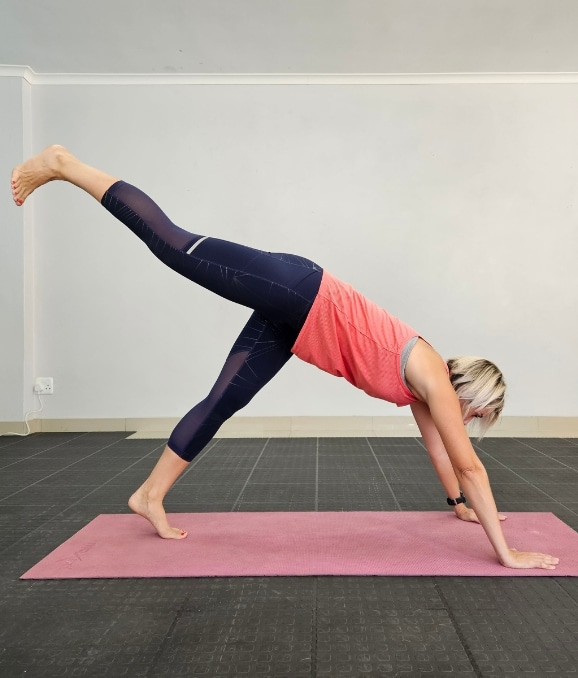
- Move into a four-point position again.
- Tighten your abdominal muscles and push back with your arms, straightening your legs as you lift your hips to move into downward dog position.
- Then, lift your right leg, stacking your top knee over your opposite hip.
- Hold this position for several deep belly breaths, in through your nose and out through your mouth.
Repeat exercise #2 (upward dog) and exercise #3 (child’s pose). Take a couple of deep belly breaths, in through your nose and out through your mouth.
7. Hamstring Rocking Stretch
Purpose: Improve flexibility in hamstrings and hips.
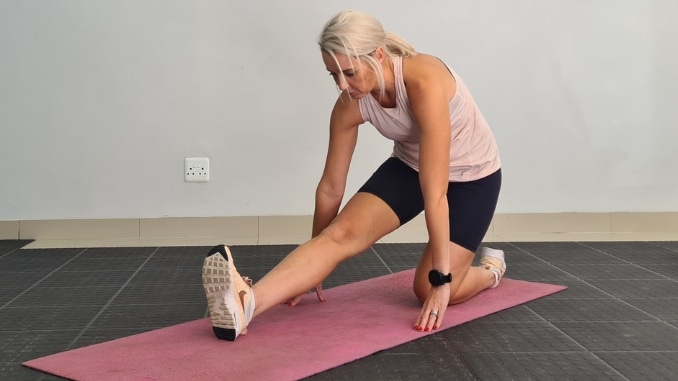
- Move to a low lunge position with your right knee planted on the floor and your left knee bent.
- Place your hands on the side for support.
- Engage your core and straighten your left knee to push your hips backwards, keeping your spine straight.
- Hold in this position for several deep belly breaths, in through your nose and out through your mouth.
You can rock your feet and hips side to side to intensify the movement.
8. Frog Squat
Targets: Hips, thighs, calf.
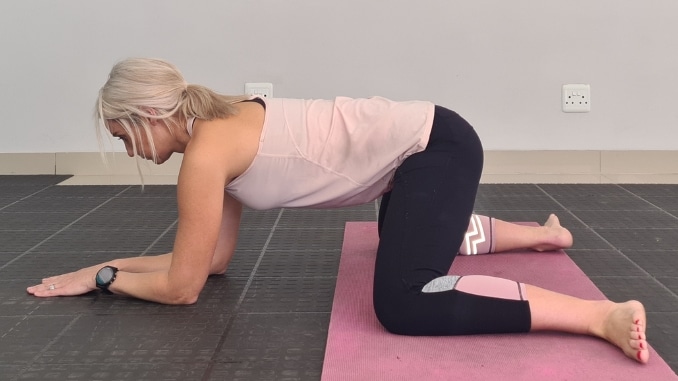
- Begin in a 4-point position with your hands beneath your shoulders and your knees under your hips.
- Engage your core muscles.
- Bend your elbows to the ground.
- Inhale and slowly move your right and left knee out towards the side as you exhale.
- Open your hips as you turn your feet out towards the side and flex your ankles so that your inner feet, inner ankles, and inner knees are touching the floor.
- Hold the position for several deep belly breaths, in through your nose and out through your mouth.
9. Forward Fold
Releases: Tension in the back, hamstrings, and calves.
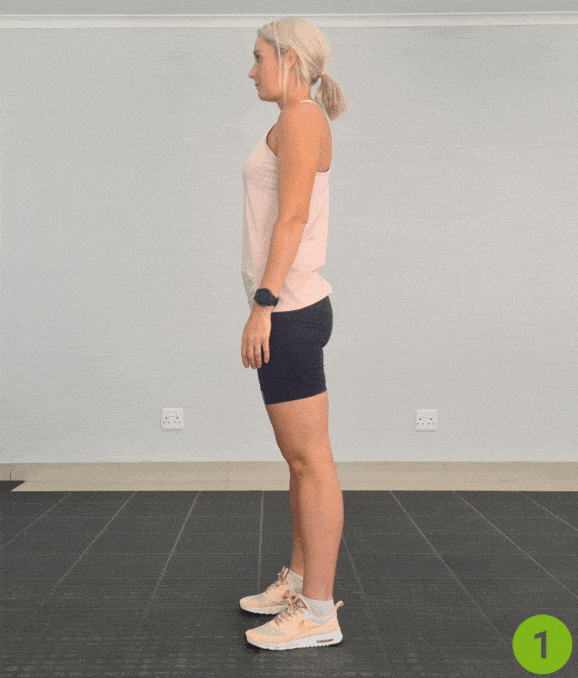
- Begin in an upright standing position with your feet hip-width apart, maintaining good alignment with your head, shoulders, hips, and legs.
- Engage your core muscles.
- Hinge through your hips to bend your upper body forward as you lower your arms to the ground.
- Hold the position for a couple of seconds.
- Relax and return to the starting position.
10. Full Body Opener
Finisher: Reconnects breath, posture, and flow.
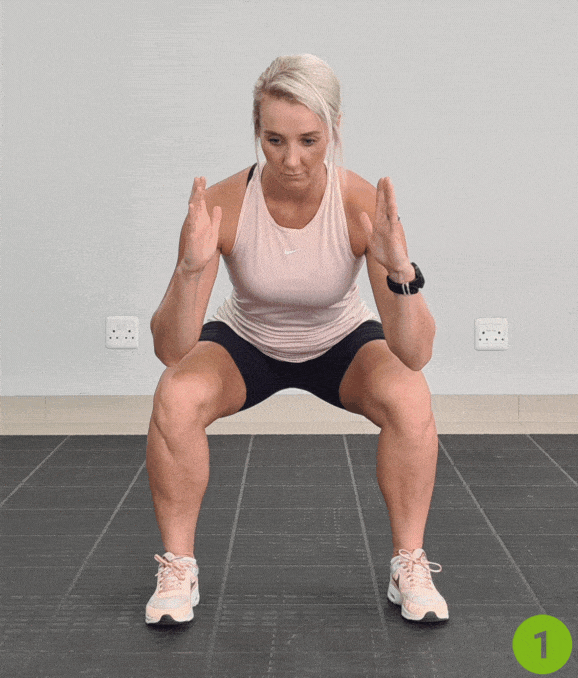
- With your hands down toward the ground, bend your knees and hinge through your hips to bend your upper body.
- Maintain proper alignment with your upper body.
- Raise back up and extend both arms overhead.
- Take a couple of deep belly breaths, in through your nose and out through your mouth.
- Repeat the movement.
“Even five minutes of post-run stretching can dramatically improve recovery and reduce injury risk. Runners often skip it, but it’s one of the simplest ways to maintain long-term joint and muscle health. Focus on the hips, calves, and hamstrings—tightness in those areas leads to the majority of overuse injuries I see.”— Dr. Jordan Metzl, author of The Running Strong
Final Stretch: Don’t Skip This
Post-run stretching isn’t just a feel-good habit—it’s your injury prevention [3] insurance. By cooling down the right way, you reduce joint strain, increase blood flow to fatigued muscles, and support your body’s natural recovery process.
The best 5-minute post run stretches are the ones you actually do—so keep the stretch simple, stay consistent, and prioritize recovery just like your runs.
Ready to feel better after every run? Watch the full 5-Minute Post-Run Stretch video and follow along with easy visual guidance.
For a yoga-based workout designed to burn fat, check out Stretching to Increase Metabolism now!
Frequently Asked Questions
Why is it important to stretch after a run?
Post-run stretching helps relax tight muscles, reduce soreness, and improve flexibility. It also supports faster recovery and lowers the risk of injuries like strains or joint pain—especially important as we age.
What muscles should I focus on in a 5-minute stretch?
Target key running muscles to improve your range of motion:
- Hamstrings
- Calves
- Hip flexors
- Quadriceps
- Glutes
Focusing on these areas helps restore range of motion and realign posture after repetitive impact.
Should I stretch immediately after running?
Yes—within 5–10 minutes post-run, while muscles are warm and pliable. This ensures a deeper, more effective stretch without straining cold muscles.
Can 5 minutes really make a difference?
Absolutely. Even a short, intentional stretch session can:
- Improve circulation
- Ease tension
- Promote muscle recovery
- Done consistently, it supports long-term mobility and joint health.
What type of stretches are best post-run—static or dynamic?
Use static stretches (holding positions for 20–30 seconds) after your run. They calm the nervous system, lengthen tight muscles, and help your body transition to recovery mode.

